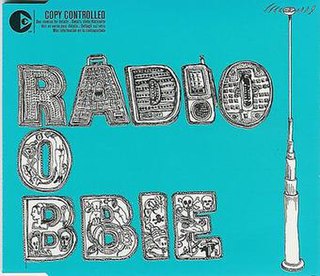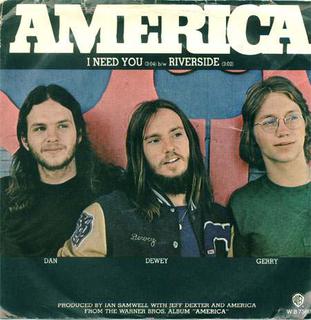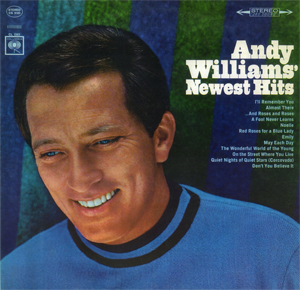Andy Williams' Greatest Hits Vol. 2 may refer to:
Andy Williams' Greatest Hits Vol. 2 may refer to:

Howard Andrew Williams was an American singer. He recorded 43 albums in his career, of which 15 have been gold certified and three platinum certified. He was also nominated for six Grammy Awards. He hosted The Andy Williams Show, a television variety show, from 1962 to 1971, along with numerous TV specials. The Andy Williams Show won three Emmy Awards. He sold more than 45 million records worldwide, including more than 10 million certified units in the United States.
Greatest Hits is a greatest hits album by English rock band the Cure. It was first released in Japan on 7 November 2001, before being released in the UK and Europe on 12 November and then in the US the day after. The band's relationship with longtime label Fiction Records came to a close, and the Cure were obliged to release one final album for the label. Lead singer Robert Smith agreed to release a greatest hits album under the condition that he could choose the tracks himself. The band also recorded a special studio album released as a bonus disc to some versions of the album. The disc, titled Acoustic Hits, consists of the eighteen songs from the North American release re-recorded using acoustic instruments.

Greatest Hits II is a 1970 greatest hits album for The Temptations, released by the Gordy (Motown) label. The sequel to the first Temptations greatest hits LP from 1966, Greatest Hits II collects several of the late-1960s hits that followed the release of the first compilation. Included here are the final collection of David Ruffin-led singles, including "(I Know) I'm Losing You", "I Wish It Would Rain" and "I Could Never Love Another ", and the first of the Dennis Edwards-led psychedelic soul records, including "Cloud Nine" and "Psychedelic Shack". A new non-album single, the #3 hit "Ball of Confusion ", is also included.

"Misunderstood" is a song by British pop singer Robbie Williams. Williams co-wrote and co-produced the song with Stephen Duffy from English band Duran Duran, who also plays the acoustic guitars, bass, and harmonica on the track. The song was released as the second single from Williams' hits compilation Greatest Hits in December 2004, peaking at number eight on the UK Singles Chart and reaching the top 10 in Denmark, Italy, and the Netherlands. The song was featured on the Bridget Jones: The Edge of Reason soundtrack.

"Radio" is a song by British pop singer Robbie Williams, co-written by Williams and Stephen Duffy. It was the first single from Williams' compilation album Greatest Hits, released in 2004. Williams wrote the song's distinctive synth-pop melody by attempting to play Harold Faltermeyer's "Axel F" on an electronic keyboard, from memory. "Radio" is Williams's first solo outing without the involvement of long-time producer and co-writer Guy Chambers, and is particularly notable as Williams's last UK number-one for eight years, until 2012's "Candy".

"Eternity" / "The Road to Mandalay" is the fifth single from English singer-songwriter Robbie Williams' third studio album, Sing When You're Winning (2000). "Eternity" does not appear on the album but was later included on Williams' Greatest Hits album in 2004. The lyrics of "Eternity" were written as a tribute to Williams' close friendship with Geri Halliwell. Brian May of Queen plays electric guitar on the track.
"Win Some Lose Some" is a song by English recording artist Robbie Williams. It was released in New Zealand in 2000 as the fifth and last single from his second studio album, I've Been Expecting You (1998). Nicole Appleton of English girl group All Saints provides the "I love you baby" telephone voice on the song.
Greatest Hits Volume Two may refer to any of the following albums:
Greatest Hits Volume Three may refer to:

Andy Williams' Greatest Hits is a compilation album by American pop singer Andy Williams that was released in early 1970 by Columbia Records. It was not, however, as its title might suggest, strictly a hit singles compilation, although some of his biggest songs since joining Columbia were included. A couple of selections were never released as singles by Williams, and his signature song, "Moon River", was released in the 7-inch single format but only for jukeboxes. His six Cadence singles that made the Top 10 on Billboard magazine's Hot 100 are passed over for the inclusion of his number 11 hit from that label, "The Hawaiian Wedding Song", and 17 of his Columbia recordings that made the Hot 100 up until 1970 are left out here in favor of "Charade", which spent its one week on the chart at number 100.

Andy Williams Sings Rodgers and Hammerstein is the second studio album by American pop singer Andy Williams and was orchestrated and conducted by Alvy West. It was released in February 1958 by Cadence Records and focuses upon songs composed by Richard Rodgers with lyrics by Oscar Hammerstein II.

The Great Songs from "My Fair Lady" and Other Broadway Hits is the fifteenth studio album by American pop singer Andy Williams and was released in September 1964 by Columbia Records, one month before the premiere of the film version of My Fair Lady starring Audrey Hepburn.

Honey is the twenty-second studio album by American pop singer Andy Williams, released in the spring of 1968 by Columbia Records. In reviewing the LP William Ruhlmann of Allmusic traced the progression of the Williams formula, noting that "he had been drawing on the recent hit parade for some of his material for years. But Honey marked his complete crossover to such an approach. Where earlier Williams albums had been a canny mix of movie songs, standards, pop hits, and foreign -- especially French -- material, ten of Honey's 11 tracks were songs that had been Top 40 hits in the last two years."

Love Story is the twenty-seventh studio album by American pop singer Andy Williams that was released on February 3, 1971, by Columbia Records. This was another in his series of cover albums, but the title track, subtitled "Where Do I Begin", was the one song included that he originated.

"I Need You," released in 1972, is the second single by the band America from their eponymous debut album America. The song was written by Gerry Beckley.

Andy Williams' Newest Hits is a compilation album by American pop singer Andy Williams that was released early in 1966 by Columbia Records and was the first LP to compile the singer's Columbia material. Seven of the 12 tracks had reached the charts in Billboard magazine, and another had been released as a single in the UK. Three album cuts were also included along with a recent B-side.

Andy Williams' Greatest Hits Vol. 2 is a compilation album by American pop singer Andy Williams that was released in June 1973 by Columbia Records. This collection follows in the footsteps of its predecessor, Andy Williams' Greatest Hits, in that it is not limited to his biggest and most recent hit singles, although his final two US Top 40 entries were included. It also has an album track not released as a single, a couple of hits from his time with Cadence Records, two other singles that could have been included on the first volume, and two Easy Listening chart entries that never made the Billboard Hot 100.

Andy Williams' Greatest Hits Vol. 2 is a compilation album by American pop singer Andy Williams that was released in the UK in 1972 by the CBS Records division of Columbia. The US album that shares this title was released in June 1973 by Columbia Records but had only three of its 11 tracks in common with those on this album and used a different cover photo and design.

Greatest Hits is a live album by American pop singer Andy Williams that was digitally recorded live in concert at the Andy Williams Moon River Theater in Branson, Missouri and released by the LaserLight division of Delta Music Inc. in 1994. It includes performances of songs that he had previously recorded during his time with the Cadence and Columbia labels as well as one he had never recorded before -- "L-O-V-E", which Nat King Cole took to number 81 pop and number 17 Easy Listening in Billboard magazine in 1964.

Andy Williams recorded 43 studio albums, 17 of which received Gold certification from the Recording Industry Association of America for selling 500,000 units. Three of those recipients went on to reach one million in sales, for which they were awarded Platinum certification. Between studio, Christmas, and compilation albums he had 37 entries on the pop albums chart in Billboard magazine with 12 of those making the top 10. One of those 12, his 1963 album Days of Wine and Roses and Other TV Requests, spent 16 weeks at number one and comes in at number five on the list of the top albums released in the 1960s in terms of Billboard chart performance. During the 1960s and early 1970s two of his Platinum LPs, The Andy Williams Christmas Album and Merry Christmas, made annual appearances on the magazine's Christmas Albums chart, where they each reached the number one position in multiple holiday seasons. In a ranking of the top album artists of the 1960s in terms of Billboard chart performance, he comes in at number eight.